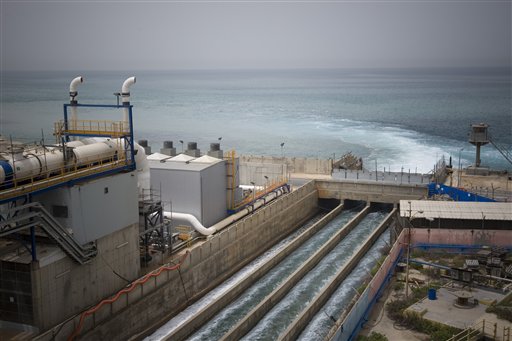 As seawater flows into the Hadera Desalination Plant, will fresh water flow into the dying Jordan River?
As seawater flows into the Hadera Desalination Plant, will fresh water flow into the dying Jordan River?
The world’s largest desalination plant using the reverse osmosis method for extracting salt from the sea is now up and running outside the Israel coastal city of Hadera, according to the Associated Press. The new plant is the third in a series of desalination plants for Israel – that when all are finally in operation – are expected to supply up to two thirds of Israel’s drinking water needs, and put less strain on the country’s main source of fresh water, the Sea of Galilee.
According to AP, the new $425 million plant will be able to desalinate 33 million gallons of fresh drinking water per year. It joins its sister plants in Ashkelon and Palmachim (near Ashdod – where the flotillas were recently docked) as part of a plan to eventually have five such plants in operation in Israel, where water resources are scarce.
 Aerial of the reverse osmosis desalination facility. Courtesy image, via IDE Technologies.
Aerial of the reverse osmosis desalination facility. Courtesy image, via IDE Technologies.
The Ashkelon plant by itself produces around 330,000 cubic meters of fresh water daily, supplying about 13% of the entire country’s needs.
While desalination is definitely a way to supply fresh water without further taxing the country’s natural water source, including the coastal and mountain aquifers, it is not the best solution from an environmental viewpoint, according to Gidon Bromberg, director of the Friends of the Earth Middle East.
The NGO with whom Green Prophet representatives were taken recently on a tour of the Lower Jordan River (where we reported the Jordan River dying), Bromberg says “could dry up from lack of water by the end of 2011”.
Bromberg said that although Israel governmental authorities are adamant in using desalination to solve the country’s water crisis, more effort needs to be made to conserve and recycle natural supplies of fresh water, including the use of “grey water” (water from washing dishes, showers and similar uses) for use in agriculture and other uses, including flushing toilets.
 Reverse osmosis in action at the IDE Hadera plant. Courtesy image.
Reverse osmosis in action at the IDE Hadera plant. Courtesy image.
While Israel currently recycles up to 70% of its wastewater, more efforts dealing with public and industrial water conservation need to be done to conserve even more water than is currently being done at present, he said.
The use of desalination for producing fresh water can be made more environmentally friendly by running these plants on solar and other forms of renewable energy, such as plants now being planned in Saudi Arabia and other countries.
Another problem with desalination plants deals with the salt residue from the desalination process which is now being channeled back into the sea, increasing the sea’s salinity.
Bromberg noted at the end of our Jordan River Media Tour:
“Projects like desalination plants and the proposed Red-Dead Sea Canal will only make the situation worse, since the last thing the Dead Sea (and Mediterranean) needs as well as the Jordan River, is more salt.”
IDE Technologies, the company responsible for the new Hadera plant, which owns 50% in it along with the Delek Group (an energy and real estate holding company owning the remaining 50%) also wants to use part of the fresh water to relieve the water shortages now experienced in Palestinian territories. IDE CEO Avshalom Felber says that “this has a political issue that is out of our hands, but we are doing our best to promote a solution to Palestinian water needs.”
More articles on reverse osmosis desalination in the Middle East:
Japan and Saudi Arabia plan Giant Desalination Equipment Plant
Desalination Plants Included in Top Seven Middle East Eco-Tourism Sites
Saudi Arabia to Replace Oil With Sun Power for Desalination Plants



It seems thats things are the wrong way round. Israel uses a lot of water for agriculture and much of this produce is exported. I understand that tis activity is not especially profitable nor particuarly important for Israel’s economy. Nevertheless Israel is prepared to spend a fortune on these plants and to import expensive and polluting energy for these plants. Would it not make more sense to reduce the amount of water intensive crops? In any case has the economic and energy debate taken place, have these questions been answered? As the title to this article states, the usefulness of these technologies, for example to save the Jordan River, are not proven.
Despite any environmental complications, if using desalinated water will enable a partial restoration of the Lower Jordan River’s natural flow, it’s worth using this method. Perhaps one day solar energy will help provide power, instead of coal or oil fired power stations.